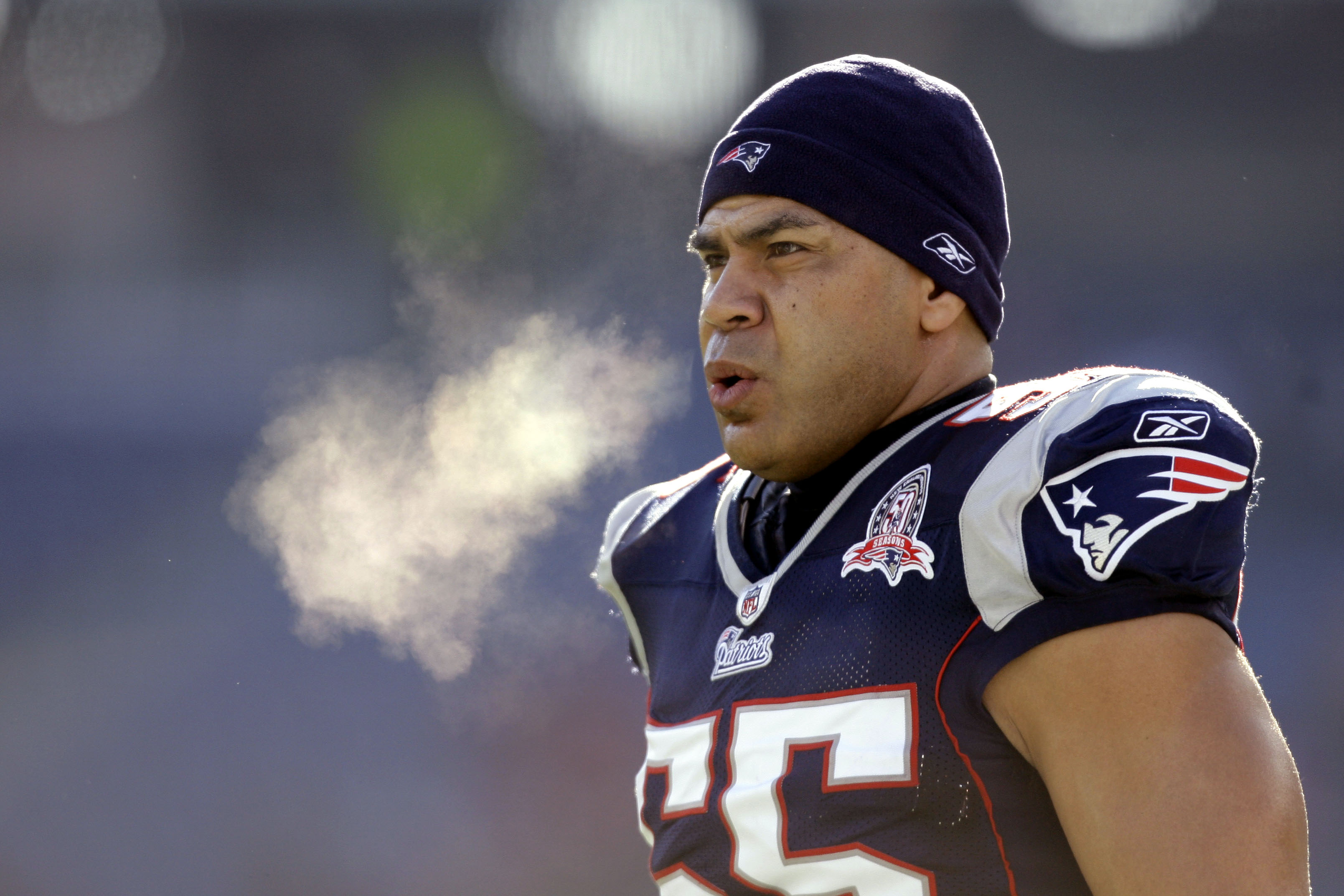Eddie Moore treasures Junior Seau's help
Friday, January 1, 1904
 In this Jan. 10, 2010 file photo, New England Patriots linebacker Junior Seau (55) warms up on the field before an NFL wild-card playoff football game in Foxborough, Mass. Police say Seau, a former NFL star, was found dead at his home in Oceanside, Calif., Wednesday, May 2, 2012, after responding to a shooting there. He was 43. (AP Photo/Charles Krupa, File)
In this Jan. 10, 2010 file photo, New England Patriots linebacker Junior Seau (55) warms up on the field before an NFL wild-card playoff football game in Foxborough, Mass. Police say Seau, a former NFL star, was found dead at his home in Oceanside, Calif., Wednesday, May 2, 2012, after responding to a shooting there. He was 43. (AP Photo/Charles Krupa, File)Glancing around his corner office inside First Volunteer Bank, anyone who isn't familiar with Eddie Moore would have difficulty realizing he had an NFL career. Desk photos are of his wife and family, and the walls aren't decorated with memorabilia from his playing days.
But that is soon to change.
Moore said he plans to hang a signed game jersey given to him by Junior Seau when they were teammates with the Miami Dolphins. It will be Moore's tribute to a mentor.
Although known as a "walking, talking motivational speaker," Seau shocked the sports world Wednesday morning when he died of a self-inflicted gunshot wound inside his Oceanside, Calif., home.
"It was really tough to hear that he had died, but especially to know he took his own life," Moore said. "Junior was just an all-around great guy. A lot of veterans are scared to teach you anything when you come into the league because you might take their job, but Junior would teach you everything he knew.
"I can say I played with one of the true legends of all time."
Just days before the 2003 NFL draft, Seau signed with the Dolphins after a 13-year career with the San Diego Chargers, which included 12 Pro Bowl selections. As Moore, who had consecutive All-SEC seasons at the University of Tennessee, awaited the calling of his name, he received a phone call from a Dolphins scout hinting that he might be the team's first selection.
"I remember telling the guy, 'Whatever, dude. Ya'll ain't going to take me -- you just signed Junior Seau,'" Moore said with a laugh. "When I got to camp, I was trying to knock everybody out with every hit, and I remember he called me aside and told me to pick my spots, that in this league you can't go for the kill shot on every play. You have to be smart to have a career in the league as long as he did, and I don't remember him having concussions."
Last year former Chicago Bears safety Dave Duerson shot himself in the chest so his brain would be preserved for science. In a suicide note, Duerson asked that it be studied by researchers investigating brain damage in NFL players. And last month, former Atlanta Falcons safety Ray Easterling committed suicide. He was suffering dementia, at 62.
More than 1,500 former players are suing the league, claiming that it ignored evidence that repeated blows to the head can trigger chronic traumatic encephalopathy, which has been linked to dementia and depression. As of now there's no direct link established between the chronic brain injuries and the death of Seau, a future Hall of Famer and one of the most respected linebackers in league history, with more than 1,800 career tackles.
"For the time I was around him, Junior was always smiling and cutting up," Moore said. "He called everybody 'Buddy,' and when I went to our first team dinner, I remember all the other rookies were loading up on a bus but Junior told the other veterans it was OK for me to stay with them. I was feeling like a big dog until I realized he only did it so I would have to pay the tab for all their dinner and drinks. I hadn't even signed my contract yet, so I was flat broke and had no way of paying what was about a $6,000 bill.
"Luckily [quarterback] Jay Fiedler knew I was broke and came over and whispered that he would take care of the check for me.
"Junior was the most inspirational motivational speaker I've ever been around before a game. Coaches never even tried to follow him if he spoke before a game, because they knew they couldn't. But he was a man who had deeper issues and his own demons that none of us knew about."